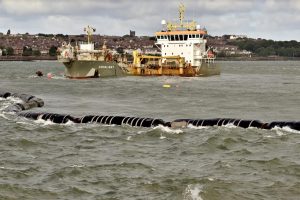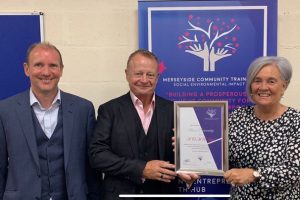North West business briefs: Reward Finance Group; Cassidy+Ashton; Everton FC; Healthy Investment; MCT

A successful Lancashire entrepreneur is branching out into property development with help from a short term business finance loan from Reward Finance Group.
Jason Hughes, who owns Kart World in Burscough and also retails cars and motorbikes, has seized the opportunity to purchase a derelict pub which he plans to demolish, replacing it with a residential development on the footplate, which includes a large car park. Planning has been granted for the scheme and the site will be split into three plots. Two of the plots have already been sold off plan, which will pay for the cost of the development, with Jason keeping the third plot for himself.
Jason said: “I once owned the pub but sadly the new owner was unable to maintain it as a going concern and closed it five years ago. He recently applied for, and was granted, planning permission to knock it down and build eight houses.
“When I heard that he was retiring and selling off his assets I leapt at the opportunity to buy it back knowing that it had already been given the go ahead to change it from commercial to residential use. I reduced the number of units on the plot to build three much larger houses, as I wanted one of them for myself.
“I was introduced to Mike Calvert at Reward Finance Group by Gary Beggs of Pomegranate Commercial Finance in Liverpool. Having recognised the merits of the site Mike quickly organised the funding enabling me to purchase the pub and progress the development.”
Mike Calvert, business development director for Reward in the North West, said: “Jason is a well known entrepreneur in the area with a number of successful businesses. He is a shrewd operator and we quickly recognised his strategy to build and sell two homes which would, in effect, completely fund the third for himself. With the right security in place, we had no hesitation in turning around the funds in a few days so he could grab the opportunity.”
::

DCBL Stadium
The building surveying division at the Chester office of Cassidy + Ashton has been appointed to take a lead role in a major project at Halton’s DCBL Stadium, aimed at reducing its carbon footprint. Cassidy + Ashton, a specialist practice of architects, planners and surveyors, is working with Halton Borough Council on the £1.67m energy-efficiency stadium project in Widnes, which is home of Rugby League side, Widnes Vikings, and American football team, Halton Spartans.
The project, expected to be completed in March 2022, is part of Halton Borough Council’s aim to tackle climate change. It has been enabled by a £1.3m grant secured through the Government’s Public Sector Decarbonisation Scheme (PSDS), which is run by Salix, a non-departmental public body, owned by the Government. The aim of the fund is to improve energy efficiency, reduce carbon emissions and lower energy bills.
The works will include changing the heating system from gas fired boilers to air source pumps, changing all lights including floodlights to LED lighting and the installation of new ceilings and insulation across its stands. The stadium is also drawing power from the recently constructed solar farm on St Michael’s Golf Course.
Cassidy + Ashton’s team is being led by director, Dave Owen. The firm advised Halton Borough Council on the grant submission, procured contractors for the project, provided technical designs for the project and is now providing a contract administrator role. Dave Owen said: “This scheme is important to Cassidy + Ashton and Halton Borough Council as it is furthering the efforts to reduce carbon emissions across the world and will assist in reaching specific targets set out by our government.”
Cllr Phil Harris, Halton Borough Council’s portfolio holder for climate change, said: “It is great news that we are continuing to improve energy efficiency and carbon reduction with another project to address climate change. There’s still more to be done but there are further initiatives on the way.”
::

Dredger moored off Bramley-Moore Dock
Sand dredged from the Irish Sea is being pumped into Bramley-Moore Dock as the foundations for Everton’s new stadium begin to take shape. Over the next three months the Grade II-listed dock, which is 325m long, 125m wide and 10m deep, will be infilled with more than 450,000 cubic metres of fluidised sand, via a pipeline connected to a dredger moored in the River Mersey. The sand itself is collected from Liverpool Bay and the Irish Sea, about 25 miles north of Bramley-Moore Dock.
Everton’s stadium development director, Colin Chong, said: “This is a huge maritime engineering project and, in many ways, the very laying of the foundations for the new stadium. All the preparatory work so far, in raking the dock bed of unwanted materials and the relocation of marine life, has led to this important stage and now the dock itself has been sealed, work has begun on filling the dock. We expect the whole infilling process to take around four months, and is a hugely complicated process.”
He added: “A trailer dredger is connected to a discharge pipeline floating on the surface of the shore, and the sand is then fluidised in a hopper then hydraulically pumped, via the pipeline, over the River Mersey wall to a spreader pontoon within the dock. This pontoon will then evenly distribute the sand within the dock and displace the water into a neighbouring dock and this continues until the reclamation of land is above the original dock water level.”
Once the dock is infilled with sand, a controlled process will consolidate the upper six metres by dropping a nine-tonne weight, at a frequency of 60 times per minute. The resulting compacted and rolled surface will then be suitable for the piling process, which begins early next year. This will form the sub-structure of the new 52,888 capacity stadium.
The development in Liverpool’s Northern Docks is recognised as the largest single-site private sector development currently in construction in the UK. The transformational development is a symbol of how the Liverpool City Region is leading the North and the UK’s post-pandemic recovery by delivering one of the largest packages of public benefits ever seen in the North West, generating a £1.3bn boost to the economy, creating thousands of jobs and attracting 1.4m visitors to the Liverpool City Region.
::

Peter Green
Bury-based provider of savings and investments, Healthy Investment, has relaunched its flagship Ethical With-Profits Fund and Ethical Child Trust Fund after overhauling the criteria by which these funds make investment decisions. The changes align the funds’ investments with members’ stated environmental and social values.
The mutually-owned ethical investments pioneer made the move following consultation with customers who, as “members”, own the historic friendly society. As a result it has extended the range of business activities it excludes and set out the types of socially positive activities it will actively support. This move also follows Healthy Investment’s recent acceptance as a signatory to the UN-backed Principles of Responsible Investment. It was only the second UK friendly society to join this initiative, which is widely recognised as the industry gold standard.
Healthy Investment was founded in 1835 and has its roots in the temperance movement that developed during the industrial revolution. Its investment funds have, for many years, avoided investing in companies directly involved in the alcohol, tobacco, pornography, gambling or arms trades. Following its consultation with members in 2020, it has added several additional business activities to the list of sectors to avoid. These include a range of environmental exclusions, such as highly carbon-intensive industries, fossil fuel extraction or production, harmful chemical industries, companies involved in the agricultural use of genetically modified organisms and businesses whose activities contribute significantly to deforestation.
Other new exclusions include companies that manufacture or sell fur products, that manufacture products or ingredients that have been tested on animals, or that have significant exposure to factory farming. Companies with unethical business or employment practices are also now systematically excluded.
Chief executive, Peter Green, said: “We are enormously proud to have been at the forefront of ethical investment since long before it received mainstream attention. However, the world doesn’t stand still and it is important that we remain true, not only to our founders’ values, but also those of our current membership. Last year we surveyed our members and discovered they wanted us to be stricter in terms of the range of sectors and activities we excluded from our portfolios and, in tandem, to take a more positive approach to seeking out investments that make a difference. They don’t just want to invest with clear consciences but actually to put their money to work making the world a better place.”
::

From left: James Aspden, Steve Gore and Sandra Kirkham
Two of Liverpool City Region’s most influential leadership coaches have joined forces with Merseyside Community Training to help and inspire young people on their business journeys.
Steve Gore and James Aspden, co-owners of KOAP, have become MCT’s first corporate partners as it expands to develop the next generation of local entrepreneurs and build employability skills throughout the region. Their role will be focused on growing the entrepreneurial ideas of MCT’s young talent, raising awareness of key routes to furthering their business ideas and acting as mentors to young people on the organisation’s training and development programmes, supporting and guiding them as they prepare for further education and employment.
Steve, who has spent a working lifetime in senior management and training and development in the international technology sector, said: “Some of the best companies in the world are being led by people whose main driver of success is total passion for what they do. There’s already so much excitement and enthusiasm among the young people at MCT whose start-up businesses are beginning to get off the ground and we can’t wait to begin working with them to help take them further down the entrepreneurship route.”
Merseyside Community Training, a not-for-profit organisation with headquarters in Birkenhead, began trading a year ago to set the most disadvantaged out-of-work young people on Wirral on the road to employment by offering them work experience placements with local organisations. Since then – but still targeting those most in need – it has expanded its operation into the wider Liverpool City Region, delivering ambitious and innovative community-based projects which have social value as well as making an impact on the local economy.
Sandra Kirkham, chair of the Board at Merseyside Community Training, added: “The willingness by Steve and James to share their time, energy and expertise with our members will be invaluable. We are privileged that KOAP share our values and are as passionate as we are about making a difference to local unemployed young people.”







